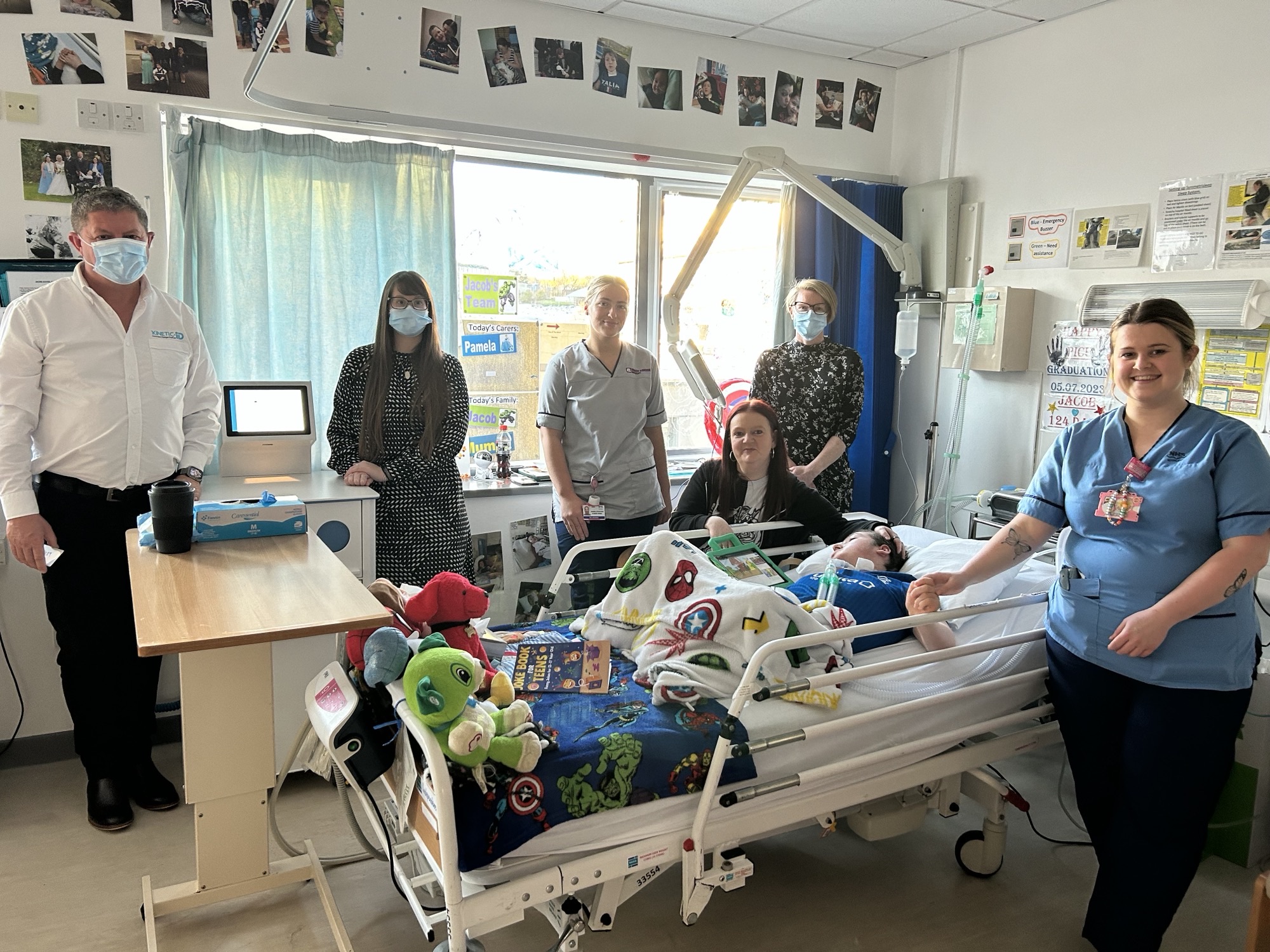NHS Grampian trials world-first tech for patients
Published: 14/11/2024 10:52A local mum who has been helping NHS Grampian to trial some world-first new tech provided by IT solutions firm Kinetic-ID says it “helps me to be mum again.”
The medical ward at Royal Aberdeen Children’s Hospital has provided the first testing site in the UK for a new ‘Bedside Intelligent Cabinet’ which stores routine medicines securely and alerts patients (or guardians) when it’s time to take their medication.
NHS Grampian’s Innovation Hub was approached to see if they could support the trial at the end of last year and the request tied in perfectly with plans to help facilitate the self-administration of medicines.

Medication Safety Advisor at NHS Grampian, Lindsay Cameron explained: “Self-administration of medicine is about supporting individuals to take their own medication while in hospital. It’s not suitable for every patient or every medicine, but it can improve patient satisfaction and confidence, encourage independence and self-care in a safe environment, and improve an individual’s knowledge and understanding of their medication. This can help those already on medicines to continue to self-administer while they are admitted to hospital and others getting used to new medications to feel better prepared when it’s time to go home.”
Staff are also provided with updates from the Bedside Intelligent Cabinet, and alerts if any medication is missed. They have suggested it would be great if newer models could generate a log of all medication the patient has self-administered. This is being considered by the team at Kinetic-ID.
Wayne Miller, Senior Solutions Consultant at Kinetic-ID, is impressed by the pace and forward-thinking shown by NHS Grampian colleagues. He said: “This product has the potential to change healthcare not just in the UK but across the globe. The development of the Bedside Intelligent Cabinet would have been much, much slower without the input of NHS Grampian and I don't think we would ever get our product market-ready and fit for purpose without their help.
“They’re a great team who have always been quick to respond; they’re as keen as we are to make sure it works for the patient, and it works reliably. We now have interest from other hospitals across the UK and beyond, and we really are grateful to the NHS Grampian Innovation Hub and all the nursing and pharmacy staff who have played their part. We’re looking forward to continuing this partnership.”
Kirsty Mair, who has spent the last 16 months in Royal Aberdeen Children’s Hospital with her son Jacob Shaw (13) says they’re pleased to have played a part in shaping technology which could help more families in the future. Kirsty commented: “Jacob has arnold chiari malformation and has been in and out of hospital since he was born. As his mum and full-time carer, it has been difficult during previous admissions to give up my role providing him with all his medicines. The Bedside Intelligent Cabinet helps me to be mum again.
“It has totally changed things for us because I don’t have to rely on other people; I can do it myself. The really good thing about it is if you’re late giving medication it flashes up red. It’s absolutely brilliant – I want one for the house.”
Jacob has very complex needs and was the first patient in Scotland to have a shunt (to treat a build-up of fluid on the brain) that drains into his gallbladder. Kirsty has benefitted from staying in the Archie Family Centre accommodation within the children’s hospital and has been receiving support to relocate permanently from Portsoy to Aberdeen. It’s hoped this will make it possible for Jacob, who has a tracheostomy and requires 24/7 support with his breathing, to be discharged in time for Christmas.
Next steps for the Bedside Intelligent Cabinet include exploring whether it’s possible to sync its software to technology used by the hospital to keep patient records. This could help to automate the process of updating the machine with patients’ prescriptions. There is potential for the technology to be used across the North of Scotland.
One of Jacob’s nurses, Anna Jenneson said: “Families as well as the staff team here at the children’s hospital have shared suggestions with Kinetic-ID about how the Bedside Intelligent Cabinet could be improved. It’s great to see these changes coming to life with the updated prototypes which now have bigger screens and better handles.
“This new technology helps us help families by empowering them to continue giving meds or get to know new medicines, supporting their routine and reassurance. It also prompts questions and helpful conversations with us nursing staff who are always on hand. It’s a really positive step in the right direction.”
Dr Andrew Keen, Clinical Director of Innovation at NHS Grampian added: “The Innovation Hub is focused on co-developing and evaluating technology that has the potential to help us with major healthcare challenges. We’re proud to be supporting Kinetic-ID with this venture and are grateful to our colleagues and patients who go above and beyond to help us improve care for future generations.”
If you are aware of promising emerging healthcare technology or existing technology with significant evidence gaps that NHS Grampian may be able to support, please email gram.innovation-hub@nhs.scot
---
NHS Grampian’s Innovation Hub was established in 2016 with aims to match the best ideas and solutions with our most difficult healthcare challenges. The team works with patients, colleagues, industry partners and academia to improve patient care for today, building on the legacy of innovation in the North-east for generations to come.
